一般过去式与现在完成时的区别
现在完成时与一般过去时的区别
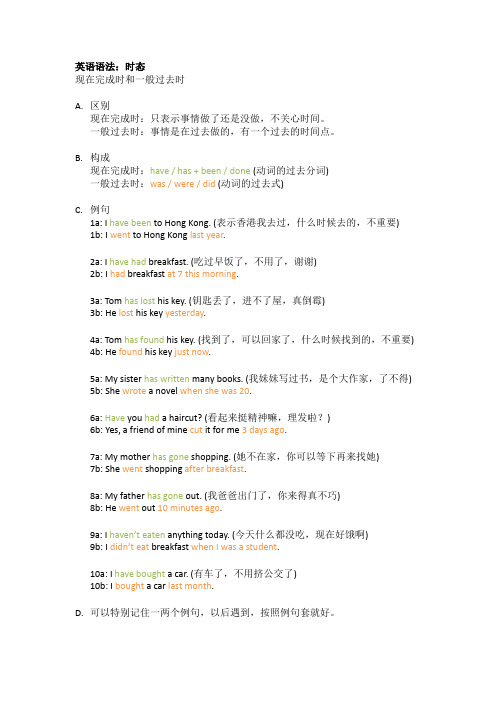
英语语法:时态现在完成时和一般过去时A.区别现在完成时:只表示事情做了还是没做,不关心时间。
一般过去时:事情是在过去做的,有一个过去的时间点。
B.构成现在完成时:have / has + been / done (动词的过去分词)一般过去时:was / were / did (动词的过去式)C.例句1a: I have been to Hong Kong. (表示香港我去过,什么时候去的,不重要) 1b: I went to Hong Kong last year.2a: I have had breakfast. (吃过早饭了,不用了,谢谢)2b: I had breakfast at 7 this morning.3a: Tom has lost his key. (钥匙丢了,进不了屋,真倒霉)3b: He lost his key yesterday.4a: Tom has found his key. (找到了,可以回家了,什么时候找到的,不重要) 4b: He found his key just now.5a: My sister has written many books. (我妹妹写过书,是个大作家,了不得) 5b: She wrote a novel when she was 20.6a: Have you had a haircut? (看起来挺精神嘛,理发啦?)6b: Yes, a friend of mine cut it for me 3 days ago.7a: My mother has gone shopping. (她不在家,你可以等下再来找她)7b: She went shopping after breakfast.8a: My father has gone out. (我爸爸出门了,你来得真不巧)8b: He went out 10 minutes ago.9a: I haven’t eaten anything today. (今天什么都没吃,现在好饿啊)9b: I didn’t eat breakfast when I was a student.10a: I have bought a car. (有车了,不用挤公交了)10b: I bought a car last month.D.可以特别记住一两个例句,以后遇到,按照例句套就好。
现在完成时与一般过去时的比较

北京四中撰稿:贾巍编审:毕勤责编:任淑弘现在完成时与一般过去时的比较(一)一般过去时态和现在完成时态的概念一般过去时表示在过去某个时间发生的动词或存在的状态,也表示过去经常或反复发生的动作常与yesterday, yesterday afternoon, last year, in 1965, a moment ago 等表示过去的时间状语连用, 例如:He came here yesterday.现在完成时表示过去的动作(或状态)对现在产生的影响和结果, 例如:He has broken his bottle.(二)一般过去时态和现在完成时的区别:1)现在完成时是表示过去的动作与现在的联系,主要说明的是现在的情况和状态;而一般过去时则强调动作发生在过去某一时间,与现在不发生联系, 例如:We haven't seen him since last year.我们自从去年以来一直未见到他。
(现在还未见到)We didn't see him last year.我们去年没见到他。
(现在不一定未见到)2)现在完成时表示从过去发生一直持续到现在(包括现在)的某个动作或状态,与现在有关的时间状语连用,一般过去时表示过去某一特定(与现在无关)的时间,与具体的表示过去的时间状语连用, 例如:He has lived here since he was born.自他出生以来一直居住在这儿。
(since自从…以来与现在有关,说明还居住在这儿。
)Liumei went to see her grandmother last night.刘梅昨晚去看了她外婆。
(只说明昨晚)(三)值得注意的几个问题:1)动作发生在过去,一直持续到说话的时候,并且还在延续时,要用现在完成时,例如:We have studied English for two years.我们学英语两年了。
2)指过去的经历,但没有表示过去的时间状语,要用现在完成时,例如:I have been to Shanghai twice.我曾去过上海两次。
现在完成时和一般过去时的比较
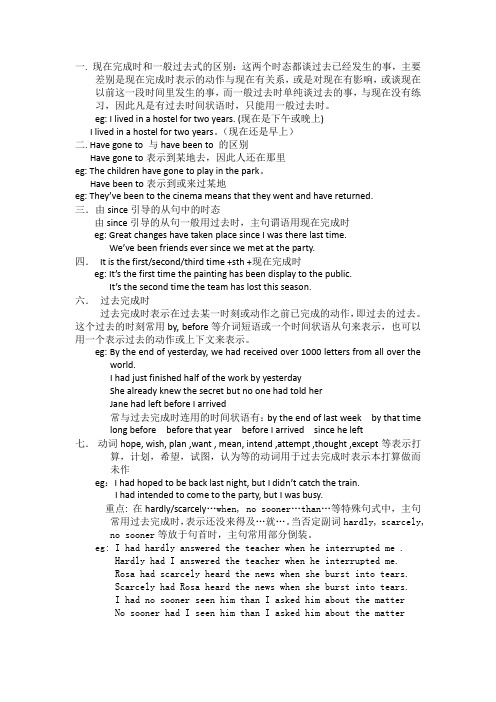
一. 现在完成时和一般过去式的区别:这两个时态都谈过去已经发生的事,主要差别是现在完成时表示的动作与现在有关系,或是对现在有影响,或谈现在以前这一段时间里发生的事,而一般过去时单纯谈过去的事,与现在没有练习,因此凡是有过去时间状语时,只能用一般过去时。
eg: I lived in a hostel for two years. (现在是下午或晚上)I lived in a hostel for two years。
(现在还是早上)二. Have gone to 与have been to 的区别Have gone to表示到某地去,因此人还在那里eg: The children have gone to play in the park。
Have been to表示到或来过某地eg: They’ve been to the cinema means that they went and have returned.三.由since引导的从句中的时态由since引导的从句一般用过去时,主句谓语用现在完成时eg: Great changes have taken place since I was there last time.We’ve been friends ever since we met at the party.四.It is the first/second/third time +sth +现在完成时eg: It’s the first time the painting has been display to the public.It’s the second time the team has lost this season.六.过去完成时过去完成时表示在过去某一时刻或动作之前已完成的动作,即过去的过去。
这个过去的时刻常用by, before等介词短语或一个时间状语从句来表示,也可以用一个表示过去的动作或上下文来表示。
英语现在完成时与一般过去时的区别
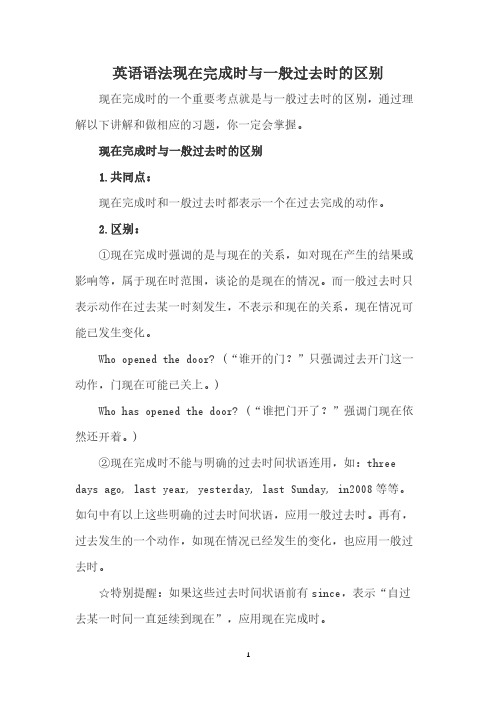
英语语法现在完成时与一般过去时的区别现在完成时的一个重要考点就是与一般过去时的区别,通过理解以下讲解和做相应的习题,你一定会掌握。
现在完成时与一般过去时的区别1.共同点:现在完成时和一般过去时都表示一个在过去完成的动作。
2.区别:①现在完成时强调的是与现在的关系,如对现在产生的结果或影响等,属于现在时范围,谈论的是现在的情况。
而一般过去时只表示动作在过去某一时刻发生,不表示和现在的关系,现在情况可能已发生变化。
Who opened the door? (“谁开的门?”只强调过去开门这一动作,门现在可能已关上。
)Who has opened the door? (“谁把门开了?”强调门现在依然还开着。
)②现在完成时不能与明确的过去时间状语连用,如:three days ago, last year, yesterday, last Sunday, in2008等等。
如句中有以上这些明确的过去时间状语,应用一般过去时。
再有,过去发生的一个动作,如现在情况已经发生的变化,也应用一般过去时。
☆特别提醒:如果这些过去时间状语前有since,表示“自过去某一时间一直延续到现在”,应用现在完成时。
He finished reading the book the day before yesterday.I put my ruler in my pencil-box, but I can’t find it now.My cousin has been in Nanjing since 2009.③现在完成时不与when引导的特殊疑问句连用,when后只用一般过去时表示已发生的动作。
但现在完成时可与where, why等疑问词连用。
如:Where have you been? (你去过哪里了?) --The train has left.--When did the train leave?④since引导的时间状语从句后面用一般过去时,只有前面的主句才用现在完成时。
现在完成时与一般过去时的区别例句
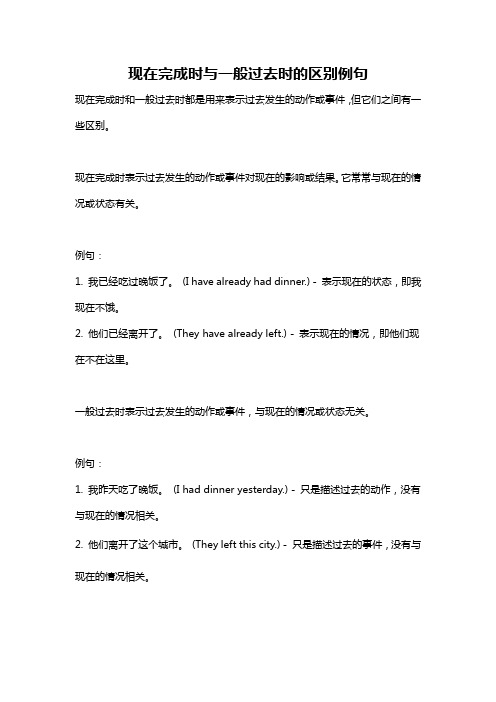
现在完成时与一般过去时的区别例句
现在完成时和一般过去时都是用来表示过去发生的动作或事件,但它们之间有一些区别。
现在完成时表示过去发生的动作或事件对现在的影响或结果。
它常常与现在的情况或状态有关。
例句:
1. 我已经吃过晚饭了。
(I have already had dinner.) - 表示现在的状态,即我现在不饿。
2. 他们已经离开了。
(They have already left.) - 表示现在的情况,即他们现在不在这里。
一般过去时表示过去发生的动作或事件,与现在的情况或状态无关。
例句:
1. 我昨天吃了晚饭。
(I had dinner yesterday.) - 只是描述过去的动作,没有与现在的情况相关。
2. 他们离开了这个城市。
(They left this city.) - 只是描述过去的事件,没有与现在的情况相关。
语法精讲|一般过去时和现在完成时的用法区别
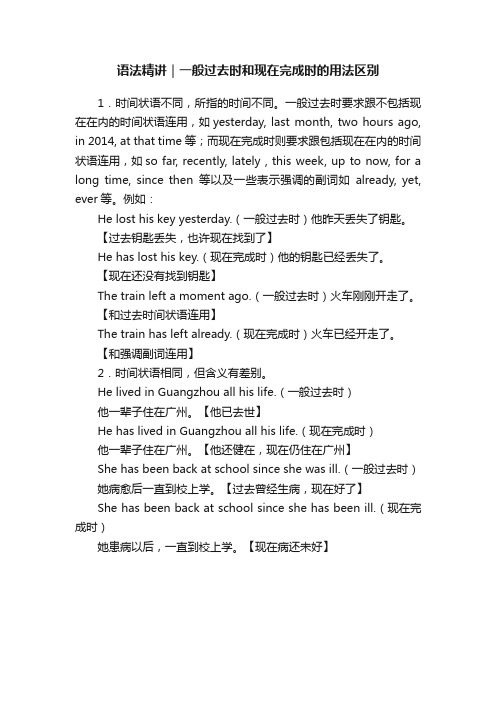
语法精讲|一般过去时和现在完成时的用法区别1.时间状语不同,所指的时间不同。
一般过去时要求跟不包括现在在内的时间状语连用,如yesterday, last month, two hours ago, in 2014, at that time等;而现在完成时则要求跟包括现在在内的时间状语连用,如so far, recently, lately , this week, up to now, for a long time, since then等以及一些表示强调的副词如already, yet, ever等。
例如:He lost his key yesterday.(一般过去时)他昨天丢失了钥匙。
【过去钥匙丢失,也许现在找到了】He has lost his key.(现在完成时)他的钥匙已经丢失了。
【现在还没有找到钥匙】The train left a moment ago.(一般过去时)火车刚刚开走了。
【和过去时间状语连用】The train has left already.(现在完成时)火车已经开走了。
【和强调副词连用】2.时间状语相同,但含义有差别。
He lived in Guangzhou all his life.(一般过去时)他一辈子住在广州。
【他已去世】He has lived in Guangzhou all his life.(现在完成时)他一辈子住在广州。
【他还健在,现在仍住在广州】She has been back at school since she was ill.(一般过去时)她病愈后一直到校上学。
【过去曾经生病,现在好了】She has been back at school since she has been ill.(现在完成时)她患病以后,一直到校上学。
【现在病还未好】。
一般过去时和现在完成时的区别
区分一般过去时和现在完成时一.相同点:1. 这两中时态中的动作都发生在过去2. 倘若这个动词的过去时是加ed构成,那么这个动词的过去分词和过去时相同例如:I cleaned(过去时) the room yesterday.I have already cleaned(过去分词)the room.二.不同点1. 一般过去时表示过去某个时间发生的事、存在的状态或经常发生的动作,说话的侧重点在于陈述一件过去的事情,与现在没有关系。
如果你只是要陈述你做了什么,陈述的东西和目前状况没有太大影响,就用一般过去时;现在完成时表示与现在有关系的发生在过去的动作,到现在为止这个动作可能结束也可能继续下去。
它不与表示过去的时间状语连用. 例如:(1.) I washed the plate. “我洗盘子了”(那么洗盘子这个话题基本到此打住,基本没有下文)(1.) I have washed the plate. “我已经洗好盘子了。
”(强调做过,完成了。
还有可能意思是,既然我已经洗好盘子了,我就该干什么什么了,或者你就应该履行什么承诺之类的。
)(2.)I saw the film yesterday. 强调看电影的时间是昨天。
(2.) I have seen the flim.我已经看过这部电影了(我现在知道电影的内容/ 我不想在看这电影了,我们选其他的吧。
)(3.) I taught here for eight years我在这教过八年书(只陈述过去的事实,现在可能不在这教书了)(3.) I have taught here for eight years 我在这教书八年了(现在还在教,还可能继续教下去)(4.) I leanrt English for six years 我学过六年英语(以前学过,现在可能不学了)(4.) I have learnt English for six years我学英语已经学了六年了(现在还在学,可能还要学下去)2. 常连用的时间状语不同(1)常与一般过去时连用的时间状语yesterday (morning, afternoon, evening):昨天(早上,下午,晚上)the day before yesterday前天last+时间名词:上一个…如:last night (week,Sunday,weekend,month,winter,year,century 世纪)时间段+ ago:在…之前如:three days ago:三天前 a moment ago刚才this morning/afternoon今天早上/ 今天下午when+ 过去时的句子:当…的时候when I got upjust now 刚刚before 以前或before+时间点at the age of 10 (过去年龄段):在10岁的时候in the old days 在古时候at that time/ moment在那时候(2)常与现在完成时连用的时间状语for + 时间段: 持续了一段时间I have lived here for 8 years.He has done his homework for two hours.since + 过去时间点/ 过去时句子:自从…开始since + 时间段+ ago:自从…开始I have lived here since 2008He has done his homework since 8:00 p.m. / He has done his homework since two hours ago.just:刚刚I have just called youever: 曾今、从来Have you even been to Beijing?Has he ever made such a mistake?never: 从未从来没有I have never been there before.already已经I have already finished my homework.yet: 还(否定句)已经(疑问句)I haven’t finished my homework yet.Have you finshed your homework yet?before: 以前Have you eaten seafood before?I haven’t seen him before.so far 到目前为止I have finished 50% of the work.In the past + 时间段In the past 20 years, China has develped rapidly.副词Just Ever Never Already Yet Before 含义刚刚曾今从来从不已经否定句:还疑问句:已经以前常用句型陈述/疑问句多用于疑问句也用于肯定/否定句否定句肯定句否定句疑问句多种句型常见位置谓语动词前谓语动词前谓语动词前谓语动词前句末句末句末用just ever never already yet before填空他刚从学校回来He has __ come back from school你以前去过广州吗?Have you been to Guangzhou __?我以前从没去过广州。
一般过去进与现在完成时与过去完成时的区别
现在完成时与一般过去时的区别1. 一般过去时表示过去某个时间发生的事、存在的状态或经常发生的动作。
说话的侧重点只在于陈述一件过去的事情,不强调对“现在”产生的影响。
如:He visited Guilin in 1998.他1998年参观过桂林。
(只说明去桂林的时间)2. 现在完成时表示动作发生在过去,对现在造成了影响或产生了结果。
不与确定的过去时间状语连用。
如:Jill has bought a new computer.吉尔买了一台新电脑。
(着重点是现在有了一台新电脑)3. 两种时态的区分(1)一般过去时的谓语动词用过去式,而现在完成时的谓语基本构成是“助动词have /has +过去分词”。
如:(2)一般过去时通常与表示过去的时间状语连用。
如:yesterday, last week, two years ago, just now, in 2002等;而现在完成时则常与just, already, ever, never等副词和these days, this week, since..., for...等表示一段时间的状语连用。
看看以下的几组句子,有什么区别?①Have you seen the film?(A)Did you see the film?(B)[说明] 你看过这部电影吗?(A)句强调的是被问者对剧情是否了解;(B)句强调的是看这部电影的动作是否发生过,并不强调是否知道其内容。
②How has he done it?(A)How did he do it?(B)[说明]他是怎么做的这件事?(A)句强调的是他做这件事的方式对现在产生了某种影响;(B)句单纯的询问做这件事的方式。
③He has lived in Beijing for 8 years.(A)He lived in Beijing for 8 years.(B)[说明]他在北京住了8年。
(A)句讲的是到目前为止他在北京住了8年,可能还会继续在北京住下去。
一般过去式,现在完成时区别
1、现在完成时的定义:现在完成时通常是指过去某一动作对现在的影响或过去某一动作持续到现在(可能要继续下去)2、现在完成时的构成:现在完成时是由“助动词have/has+过去分词”构成的3、现在完成时的用法:(1) 表示从过去到现在曾经经历过或做过的事情(2) 表示过去发生的动作对现在所产生的影响(3) 表示从过去某时开始的动作,状态一直持续到现在一般过去时也译为单纯过去时。
例A:He worked very hard last year.(去年他很用功。
)例B:Mr. Smith bought a new car yesterday.(史密斯先生昨天买了一辆新车。
)例C:They were here only a few minutes ago.(几分钟前他们还在这里。
)一、一般过去时的用法:解说:一般过去时最明显的现象就是常由表达过去之时间的副词或副词短语来修饰它(如各例句的斜体字部分)。
这些常用于修饰一般过去时的副词有:yesterday, yesterday morning (afternoon, evening ), just now (刚才), before (以前) , then (at that time )(当时) , last +时间(如 last week, month, year, Monday, … January, … spring, …, etc. ), that +时间(如 that day, afternoon, summer, …, etc. ), 时间 + ago (如a few minutes ago, two weeks ago , years ago, … etc.)二、一般过去时的主要语法功能:1. 表示过去发生的动作或情况,e.g. He returned home very late last night. 他昨晚很晚回家。
He turned off TV at midnight. 他午夜才关了电视。
一般过去式与现在完成时的区别
一般过去时与现在完成时的区别(1)一般过去时表示过去某时发生的动作或单纯叙述过去的事情,强调动作;现在完成时为过去发生的,强调过去的事情对现在的影响,强调的是影响。
(2)一般过去时常与具体的时间状语连用,而现在完成时通常与模糊的时间状语连用,或无时间状语。
一般过去时的时间状语:yesterday, last week,…ago, in1980, in October, just now等,皆为具体的时间状语。
现在完成时的时间状语:for, since, so far, ever, never, just, yet,till/until, up to now, in past years, always等,皆不确定的时间状语。
共同的时间状语:this morning, tonight, this April, now, already, recently, lately 等。
(3)现在完成时可表示持续到现在的动作或状态,动词一般是延续性的,如live, teach, learn, work, study, know.。
一般过去时常用的非持续性动词有come, go, leave, start, die, finish, become, get married 等。
例如:I saw this film yesterday. (强调看的动作发生过了)I have seen this film. (强调对现在的影响,电影的内容已经知道了)Why did you get up so early? (强调起床的动作已发生过了)Who hasn't handed in his paper? (强调有卷子未交,疑为不公平竞争)He has been in the League for three years. (在团内的状态可延续)He has been a League member for three years. (是团员的状态可持续)句子中如有过去时的时间副词(如yesterday, last, week, in 1960)时,不能使用现在完成时,要用过去时。
- 1、下载文档前请自行甄别文档内容的完整性,平台不提供额外的编辑、内容补充、找答案等附加服务。
- 2、"仅部分预览"的文档,不可在线预览部分如存在完整性等问题,可反馈申请退款(可完整预览的文档不适用该条件!)。
- 3、如文档侵犯您的权益,请联系客服反馈,我们会尽快为您处理(人工客服工作时间:9:00-18:30)。
1、一般过去时与现在完成时的区别2、一般过去时表示过去某时发生的动作或单纯叙述过去的事情,强调动作;•现在完成时强调过去的事情对现在的影响或结果。
3、•例如:We are good friends(现在情况)•我们是好朋友。
•I got to know him in 2005. (过去的动作)•我在2005年认识(结识)他•We have known each other since 2005. (现在完成时把过去的动作和现在联系起来并着眼于现在)•自从2005年来我们就相互认识•4、Linda has a big house. (现在情况)•She bought the house ten years ago. (过去的动作)•She has owned the house for ten years.•She has lived in the house for ten years. (现在完成时把过去的动作和现在联系起来并着眼于现在)•5、2. 一般过去时常与具体的时间状语连用,而现在完成时通常与模糊的时间状语连用,或无时间状语。
•一般过去时的时间状语:yesterday, last week,…ago, in1980, in October,just now等,皆为具体的时间状语。
•6、现在完成时的时间状语:for, since, so far, ever, never, just, yet,till/until, up to now, in past years, always等,皆不确定或模糊的时间状语。
•共同的时间状语:this morning, tonight, this November, now, already,recently, lately 等。
•7、3. 现在完成时可表示持续到现在的动作或状态,动词一般是延续性的,如live,teach, learn, work, study, know.。
•一般过去时常用的非持续性动词有come, go, leave, start, die, finish,become, get married等。
8、•I saw this film yesterday. (强调看的动作发生过了)•I have seen this film. (强调对现在的影响,电影的内容已经知道了)•I got up five hours ago.•I have been up for five hours. (强调结果)•Why did you get up so early(强调起床的动作已发生过了)•9、Who hasn‘t handed in his paper•(强调有卷子未交,疑为不公平竞争)•He has been in the League for three years. (在团内的状态可延续)•He has been a League member for three years. (是团员的状态可持续)•10、Who hasn‘t handed in his paper•(强调有卷子未交,疑为不公平竞争)•He has been in the League for three years. (在团内的状态可延续)•He has been a League member for three years. (是团员的状态可持续)•11、for和since的运用•for表“经历(一段时间)”,而since表“自从……?以来”。
•例如:• 1. He?has?stayed?here?for?3?hours.• 2. He?has?stayed?here?since?3?hours?ago.• 3. He?has?stayed?here?since?3?o’clock.•?has?taught?English?since?he?came?here.12、Fill in the blanks with “for” or “since”:1.We have had the new computer _______ a week.2.How long have you studied EnglishI have studied English _______ I was five.3. How long has he taught in this schoolHe has taught in this school ______ 1998.4. How long have you known each otherWe have known each other ______ over ten years.5. How long have you kept your pet dogI have kept it ______ two years ago.I have kept it ______ two years.•13、They got married six months _____.•They has been married _______ six months.•They have been married _____ 6 months ____.•I first met Susan two years _____.•I have known Susan _____ two years.•I have known Susan ______ two years ago.•Sue is in the office. She’s been there _____ three hours.•Sue came to the office three hours _____.•Sue has been in the office _____ 3 hours ____.•14、James has been in Canada ______ Monday.•James has been in Canada ______ four days.•James came to Canada four days _____.•My aunt has lived in Brazil _____ 15 years.•My aunt moved to Brazil 15 years _____.•She has lived in Brazil ______ 15 years ______.•Mike has been in hospital _______ October.•Mike has been in hospital ______ two months•Mike came to the hospital two months ______•He has been in hospital ______ two months ___•15、already和yet 的区别•already常用于肯定句中或句末;yet常用于一般疑问句或否定句末。
但表惊讶时already也可用于疑问句。
例如:•?has?already?finished?his?home-work.• 2.?Tom?hasn’t?finished?his?homework yet.•! Have?you?already?finished?it•16、Shall we eat lunch I am ________ hungry.•Have you met our foreign teacher _____•No, not ______.•Has the bell rung _____•Yes, It has ________ rung.•The computer has not been repaired ____.•We have _______ changed the plan because Linda hasn’t made up her mind ______.•Have you ordered the takeaway food _____•Yes. We have ________ ordered it.17、Multiple choice.( ) 1. – Has your brother found his lost car ____- No, he hasn’t.A. stillB. alreadyC. justD. yet( ) 2. The visitors _____ here for a week.A. have leftB. have comeC. have arrivedD. have been( ) 3. Where ____ you _____ all these years, JimA. have, beenB. did , beC. were, beenD. did, stay( ) 4. I’ve ____ this dictionary ____ a year.A. bought, forB. had, forC. bought, sinceD. had, since18、( ) 5. You ____ here before, ____ youA. never are, areB. never came, doC. have never been, haveD. were never, were( ) 6. The doctor ____ to Beijing twice.A. has goneB. has beenC. wentD. goes( ) 7. My mother has ___ made a big mooncakeherself.A. alreadyB. yetC. justD. always( ) 8. -Mr Green is no longer working here. He____ here for a month.gone B. has leftC. has been away fromD. left19、Fill in the blanks with the Present Perfect Tense:1.I __________ in Shenzhen for about 15 years.(live)2. He ____________ here since 1998. (work)3. Bob isn’t in. He_________ to the cinema. (go)4. I _________ to Australia three times. (be)5. She ___________ English for about five years.(study)6. She ___________ English since 1999. (teach)20、have gone to去了某地,不在这里have been to 曾经去过某地,已回来have been in呆在某地(多长时间)She isn’t here. She has gone to the reading-room.She has been to Shanghai twice/once/before.She has been in Beijing for two years•21、have (has) gone to 意为“到某地去了”,表示到了某地或正在去某地的途中。
